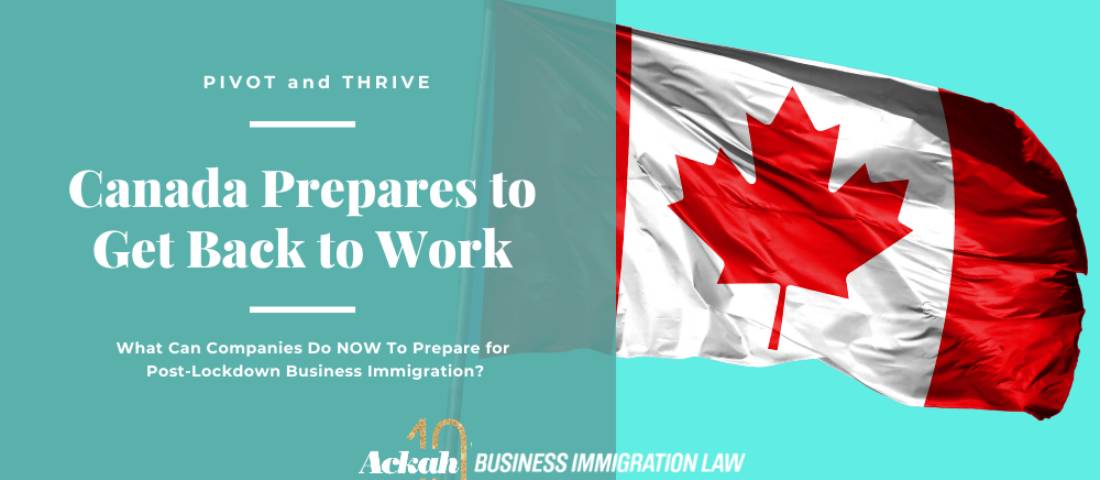What Can Companies Do NOW To Prepare for Post-Lockdown Business Immigration?
Business immigration changed overnight in March due to social distancing and self-quarantine regulations to flatten the coronavirus (COVID-19) curve and to protect our employees, their families, customers and our community. Ackah Law converted to a virtual office so our team could work remotely from home. Ackah Law already had the technology and processes in place to work remotely: as a Canadian immigration law firm with a global clientele, we service clients across the world, many whom we never meet face-to-face! For Ackah Law, the re-opening of our office doors and return to "business as usual" means we will continue to rely heavily on technology in 2020 to assist our clients 24/7/365 - we're here when they need us.
But business immigration will be "business abnormal" when companies begin to re-open, bring back furloughed workers and reassemble a global workforce.
A Pivot and Thrive mentality and plan of action are essential for Canadian businesses that rely on temporary foreign workers, international business visitors and intracompany transfers. Canada's Immigration, Refugees and Citizenship Canada (IRCC) enacted special procedures to address the quickly changing travel and quarantine regulations that meant the closure of visa offices, travel disruptions, closed government offices and lack of access to a physician. IRCC remained open - but many foreign workers could not travel to Canada due to closed borders, visa and Express Entry applications are taking longer to process, biometric appointments were missed - there are simply fewer workers available to process immigration applications, and processes are taking longer than normal.
As of May 1, many immigration programs are STILL PROCESSING BUT ARE MUCH SLOWER; IRCC offices are reduced or closed, and Canada's borders are closed to all but essential travellers.
Prepare For Immigration Backlogs
As businesses begin to gradually re-open, companies will find that much-needed foreign workers, international business visitors and key global staff cannot quickly get approved to enter Canada. With over 20 years of Canada and U.S. NAFTA immigration law experience, we know there will be unforeseen backlogs and delays.
Our Advice: Beat the Backlog. Start Your Immigration Applications TODAY
We can anticipate that a company or individual who delayed filing their Express Entry application, for example, due to the coronavirus and waits to file when the borders reopen will find that there is a significant backlog and that all immigration applications and processes will take much longer than before the pandemic. How long it will take to return to normal process times we don't know. But we do know that by starting your immigration application today, when business returns to the "new normal" your business will have the international talent you need to thrive.
Apply for NEXUS Pass
When the Canada / US borders reopen to all business travel, NEXUS program members will have expedited entry into Canada and the United States. The NEXUS trusted traveller program allows pre-screened international travelers to have expedited processing through ports of entry and airport lines when entering Canada or the United States.
Our Advice: Apply for NEXUS Pass
The normal time to get a NEXUS application interview and approval is 2 - 3 months. To avoid further delays, contact Ackah Law to jumpstart the backlog and help your business thrive. Due to the coronavirus (COVID-19) IRCC special immigration procedures, all FAST/NEXUS Enrollment Centres will remain closed until at least June 1, 2020.
Express Entry Is Open
Canada has continued to process Express Entry permanent residence applications and hold Express Entry draws during this period. IRCC will accept incomplete express entry applications provided that applicants were unable to send all the required documents due to disruptions related to COVID-19.
Our Advice: Apply now for Express Entry
The current Express Entry processing time is approximately 10 to 12 months, so applicants should not delay getting their applications in. After the lockdown eases, we anticipate a significant backlog in all immigration applications. To avoid further delays, contact Ackah Law to jumpstart the backlog and help your business thrive.
Canadians With L-1 Visas No Longer Can Renew at Border
Intracompany Transfer Work Permits to the United States:
L-1A Visa:
Executives, managers or workers with special knowledge who want to work in the United States can apply for a United States Citizen and Immigration Services (USCIS) L-1 visa. An L-1 visa is a temporary non-immigrant visa that allows countries with reciprocal agreements to give employees outside the U.S. an intracompany transfer to work in the U.S. for 3 months - 5 years.
L-1B Visa:
A USCIS L-1B intracompany visa is for professionals with special knowledge who want to temporarily work in the United States.
Our Advice: Start L-1 Visa Renewals 6-8 Months in Advance
Canadians with L-1 visas can no longer renew them at the border. CBP is telling the Canadian workers they need to file L-1 renewal applications with USCIS, instead of at the border points of entry and international airports as they have for over 20 years. Employers should start the process 6-8 months before the employee's current L-1 will expire. Canadian employees planning to submit an initial L-1 application or apply for TN visa at a U.S. port of entry should prepare for potential delays. To avoid further delays, contact Ackah Law to jumpstart the backlog and help your business thrive.
The USCIS policy change is primarily affecting skilled Canadian workers who live in Canada and work in the United States, many of whom cross the border into the U.S. daily. Previously, these workers could apply for an L-1 renewal and get approval that same day.
How Can Ackah Business Immigration Law Help Your Business Thrive?









